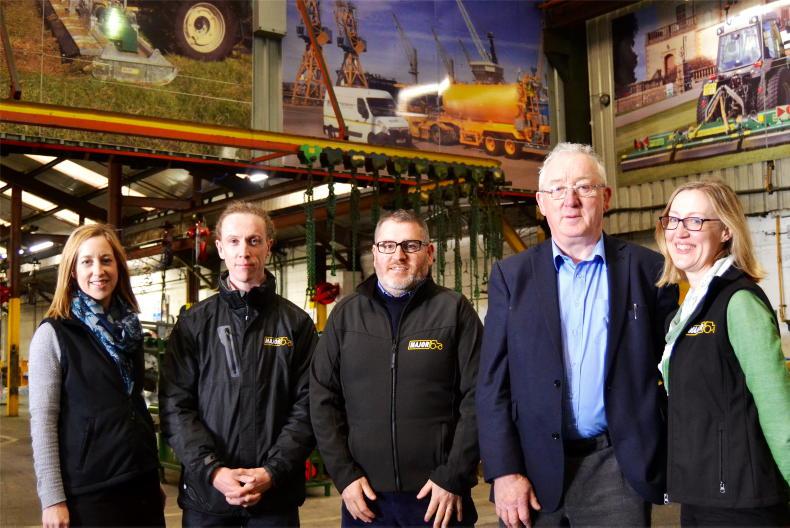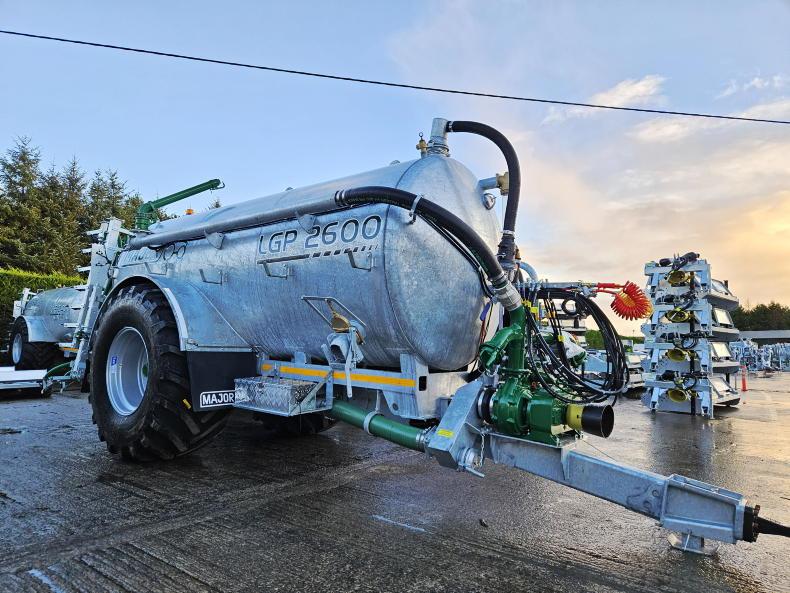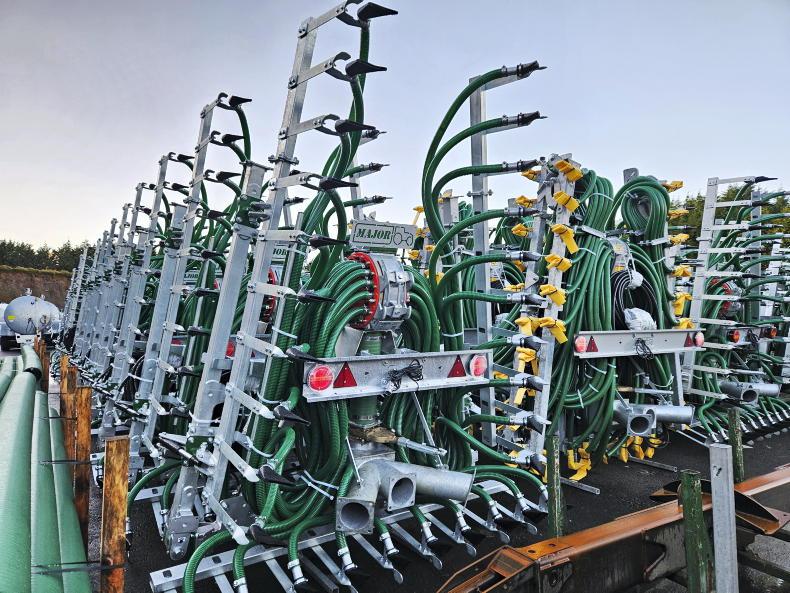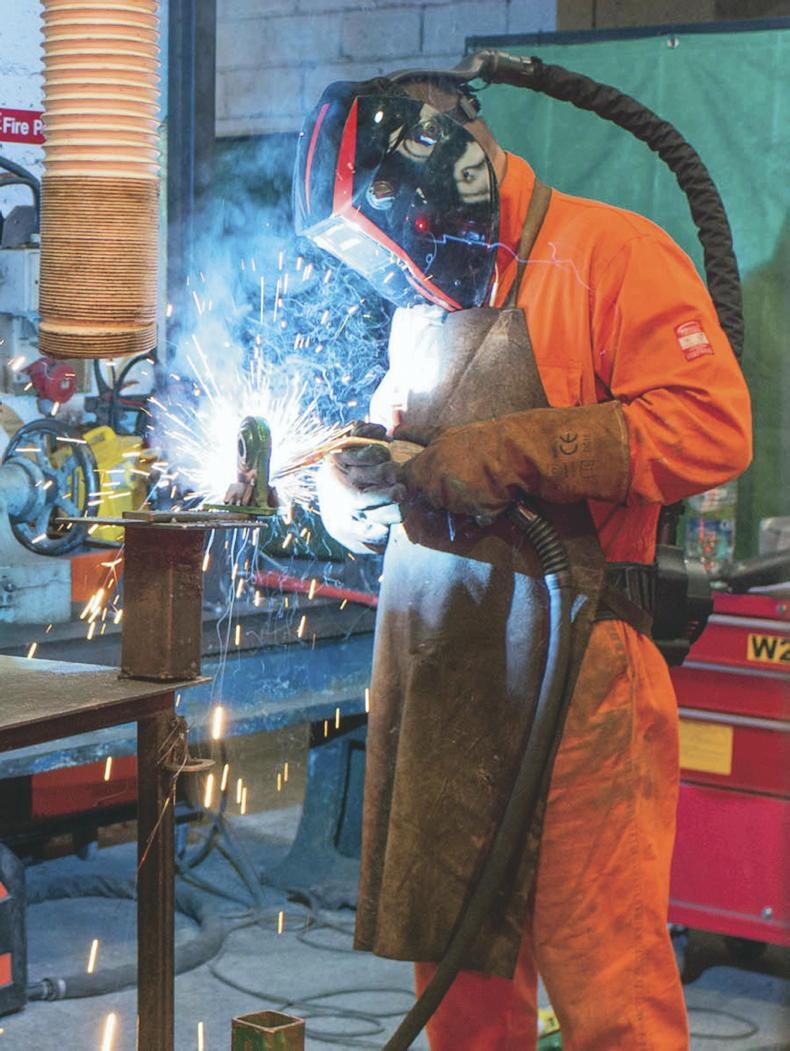Major Machinery was established from very humble beginnings, dating back to 1976. Set up by brothers John and Mark Murphy, the company is best known for its slurry tankers, of which it has manufactured an eye-watering 20,000 units. The duo grew up with a farming background, but also spent time working in England. They started out the Major business in Ballyhaunis, Co Mayo, by manufacturing bespoke retrofit cabs for small tractors. This was on the same site where the business is based today. With a team of four, they soon ventured into agricultural products, the first of which was a grassland topper.
“When Ireland joined the EEC in the 1970s, farming practices began to further develop. Slatted tanks were beginning to become a thing, and so Major entered the business of slurry handling in the early 1980s. Major exported its first products in the late 1980s, to both the UK and Denmark,” explained Eibhlin Murphy.
In the early 1990s, the company saw the need to diversify its product portfolio and create a more even flow of work all year round. So it designed an 8ft roller mower for the amenity sector.

Eibhlin Murphy, Eoin Murphy, Martin Keane, John Murphy and Aine Lecky.
Over the years, the company continuously developed its range. In 2007, John bought out his brother’s shares. Mark would later go on to set up Agri-Spread, the well-known dung and bulk fertiliser/lime-spreader manufacturing company, which is located just over the road from Major.
Products
Major’s product offering is largely broken down into two portfolios: agricultural and grass care. The agricultural offering includes slurry tankers, dribble bars, trailing shoes, disc injectors, agitators, a hedge-cutting head, toppers and the firm’s cyclone mower. The grass care division is largely roller mowers, which are designed for companies that look after amenity areas. The firm also builds a selection of specialist industrial tankers each year.
“We build tankers from 1,500 up to 4,000 gallons, up to 12m dribble bars and 10m trailing shoes. We build the tankers and attachments from scratch here at our factory. The 2,600-gallon Alpine tanker is our most popular seller. We still have waiting lists, but in line with the current market, they’re not as strong as they were in recent years. Specification has a big affect on lead times.
"A typical tanker probably carries a lead time of around four to six weeks, but a basic tanker would be less. We’ve been building low-emission slurry equipment for the past seven or eight years now and that has been going well. We’ve looked at umbilical equipment, but for now will be sticking to tankers.

"A typical tanker probably carries a lead time of around four to six weeks, but a basic tanker would be less".
“The latest new product we unveiled was our hedge-cutting head. It has received great feedback, even better than anticipated. We are planning on launching it in the UK at the Lamma show next week. Our Cyclone mower has been a big seller, not just in Ireland, but all over the world. It has proven a big hit in America, tackling maize stubble post-harvest in order to cut the remaining stalk to avoid offering shelter for the maize weevil over the winter period. We now build these from 2m up to 9.2m in width,” explained Eibhlin.
The agricultural side of the business accounts for 60% of manufacturing, followed by the grass care division at 30%, and the remaining 10% is made up of specialist tankers.
Markets
“Ireland is still our biggest market, and I think it will always be our main market, but the export market is vital for our company. We are currently exporting in the region of 65% of what we manufacture. Breaking down the figures, Ireland accounts for 35% of sales, followed by the UK at 25%, mainland Europe taking another 15%, another 15% for America and the final 10% accounted for by Australia, New Zealand and South Africa,” says Eibhlin.

"We’ve been building low-emission slurry equipment for the past seven or eight years now".
“Due to the nature of the product and the cost of shipping, slurry tankers are only manufactured for Ireland and the UK. We see the US as being the key market, with the most potential for us in the short term. We have been selling to the US for the past seven to eight years, and it currently accounts for 15% of what we build. However, we can see this at least doubling in the next two to three years,” she said.
Staff
John Murphy is still involved in the business, and it is operated today with his two daughters, Aine and Eibhlin, and his son, Eoin, in a four-way partnership. Aine is the financial director and Eibhlin is the marketing director, both of whom are based at the factory in Ballyhaunis. Meanwhile, Eoin is based at the company’s UK headquarters and looks after UK sales.
The company employ 75 staff in Mayo, 10 in the UK and one salesman in mainland Europe. The Mayo team is made up of 20 office staff (R&D, sales and admin) and 55 staff in production and stores. The 10 UK-based staff are split between sales, admin and stores. Major has had a UK base since the 1980s to supply spare parts and support its product range there.

The hedge-cutting head was one of its most recent product launches.
“Sourcing skilled staff isn’t an issue for us at the minute. It was a few years ago, but thankfully not any more. At our HQ in Ballyhaunis, our average member has worked for the company for 15-20 years,” explained Eibhlin.
Challenges and opportunities
“Our biggest challenge is the shear cost of everything. On one hand, energy, labour and raw materials continues to be very expensive for manufacturers, while the cost of finance is a problem for our customers. The changing nature of farming is a challenge all manufacturers are facing. There are less and less farmers, and more bigger farms, which means less customers. Policy decisions made with the stroke of a pen result in massive consequences for farming businesses. The move to outlaw dribble bars under TAMS created a big problem for us and many other manufacturers. We had loads of dribble bars in stock, and had heard nothing about the decision until it was published in the Irish Farmers Journal. We had to bring almost all of these machines back into the workshop and convert them into trailing shoes. This was a serious inconvenience and an unnecessary additional cost.

The Grasscare division accounts for 30% of Major's business.
“Despite the many challenges, we still see lots of opportunism out there. The grass will always grow, and it will always have to be cut. We are lucky that we made the decision to diversify our product range many years ago. Hold-ups in grant approval letters could slow things for a period, so it’s great to have a completely separate product range that keeps production busy. We see a lot more potential for export, especially to the US,” said Eibhlin.
The future
Approaching its fourth decade in business, Eibhlin said that Major plan to keep on going in the same trajectory as it is currently on.
“We want to stay on top of the slurry-handling market in Ireland, and have plans to continually further invest in our main factory to keep things up to date. This will follow a €3m investment we put into a new factory and storage facility one kilometre from our main factory only last year.

All tankers and attachments are built from scratch at Major's factory in Ballyhaunis, Co Mayo.
“The new plant has 12 employees and is currently manufacturing our Cyclone and Swift roller mower ranges. By opening this new facility, it has freed up space at our main yard and will give us the opportunity to expand our production of slurry equipment,” concluded Eibhlin.
Major Machinery was established from very humble beginnings, dating back to 1976. Set up by brothers John and Mark Murphy, the company is best known for its slurry tankers, of which it has manufactured an eye-watering 20,000 units. The duo grew up with a farming background, but also spent time working in England. They started out the Major business in Ballyhaunis, Co Mayo, by manufacturing bespoke retrofit cabs for small tractors. This was on the same site where the business is based today. With a team of four, they soon ventured into agricultural products, the first of which was a grassland topper.
“When Ireland joined the EEC in the 1970s, farming practices began to further develop. Slatted tanks were beginning to become a thing, and so Major entered the business of slurry handling in the early 1980s. Major exported its first products in the late 1980s, to both the UK and Denmark,” explained Eibhlin Murphy.
In the early 1990s, the company saw the need to diversify its product portfolio and create a more even flow of work all year round. So it designed an 8ft roller mower for the amenity sector.

Eibhlin Murphy, Eoin Murphy, Martin Keane, John Murphy and Aine Lecky.
Over the years, the company continuously developed its range. In 2007, John bought out his brother’s shares. Mark would later go on to set up Agri-Spread, the well-known dung and bulk fertiliser/lime-spreader manufacturing company, which is located just over the road from Major.
Products
Major’s product offering is largely broken down into two portfolios: agricultural and grass care. The agricultural offering includes slurry tankers, dribble bars, trailing shoes, disc injectors, agitators, a hedge-cutting head, toppers and the firm’s cyclone mower. The grass care division is largely roller mowers, which are designed for companies that look after amenity areas. The firm also builds a selection of specialist industrial tankers each year.
“We build tankers from 1,500 up to 4,000 gallons, up to 12m dribble bars and 10m trailing shoes. We build the tankers and attachments from scratch here at our factory. The 2,600-gallon Alpine tanker is our most popular seller. We still have waiting lists, but in line with the current market, they’re not as strong as they were in recent years. Specification has a big affect on lead times.
"A typical tanker probably carries a lead time of around four to six weeks, but a basic tanker would be less. We’ve been building low-emission slurry equipment for the past seven or eight years now and that has been going well. We’ve looked at umbilical equipment, but for now will be sticking to tankers.

"A typical tanker probably carries a lead time of around four to six weeks, but a basic tanker would be less".
“The latest new product we unveiled was our hedge-cutting head. It has received great feedback, even better than anticipated. We are planning on launching it in the UK at the Lamma show next week. Our Cyclone mower has been a big seller, not just in Ireland, but all over the world. It has proven a big hit in America, tackling maize stubble post-harvest in order to cut the remaining stalk to avoid offering shelter for the maize weevil over the winter period. We now build these from 2m up to 9.2m in width,” explained Eibhlin.
The agricultural side of the business accounts for 60% of manufacturing, followed by the grass care division at 30%, and the remaining 10% is made up of specialist tankers.
Markets
“Ireland is still our biggest market, and I think it will always be our main market, but the export market is vital for our company. We are currently exporting in the region of 65% of what we manufacture. Breaking down the figures, Ireland accounts for 35% of sales, followed by the UK at 25%, mainland Europe taking another 15%, another 15% for America and the final 10% accounted for by Australia, New Zealand and South Africa,” says Eibhlin.

"We’ve been building low-emission slurry equipment for the past seven or eight years now".
“Due to the nature of the product and the cost of shipping, slurry tankers are only manufactured for Ireland and the UK. We see the US as being the key market, with the most potential for us in the short term. We have been selling to the US for the past seven to eight years, and it currently accounts for 15% of what we build. However, we can see this at least doubling in the next two to three years,” she said.
Staff
John Murphy is still involved in the business, and it is operated today with his two daughters, Aine and Eibhlin, and his son, Eoin, in a four-way partnership. Aine is the financial director and Eibhlin is the marketing director, both of whom are based at the factory in Ballyhaunis. Meanwhile, Eoin is based at the company’s UK headquarters and looks after UK sales.
The company employ 75 staff in Mayo, 10 in the UK and one salesman in mainland Europe. The Mayo team is made up of 20 office staff (R&D, sales and admin) and 55 staff in production and stores. The 10 UK-based staff are split between sales, admin and stores. Major has had a UK base since the 1980s to supply spare parts and support its product range there.

The hedge-cutting head was one of its most recent product launches.
“Sourcing skilled staff isn’t an issue for us at the minute. It was a few years ago, but thankfully not any more. At our HQ in Ballyhaunis, our average member has worked for the company for 15-20 years,” explained Eibhlin.
Challenges and opportunities
“Our biggest challenge is the shear cost of everything. On one hand, energy, labour and raw materials continues to be very expensive for manufacturers, while the cost of finance is a problem for our customers. The changing nature of farming is a challenge all manufacturers are facing. There are less and less farmers, and more bigger farms, which means less customers. Policy decisions made with the stroke of a pen result in massive consequences for farming businesses. The move to outlaw dribble bars under TAMS created a big problem for us and many other manufacturers. We had loads of dribble bars in stock, and had heard nothing about the decision until it was published in the Irish Farmers Journal. We had to bring almost all of these machines back into the workshop and convert them into trailing shoes. This was a serious inconvenience and an unnecessary additional cost.

The Grasscare division accounts for 30% of Major's business.
“Despite the many challenges, we still see lots of opportunism out there. The grass will always grow, and it will always have to be cut. We are lucky that we made the decision to diversify our product range many years ago. Hold-ups in grant approval letters could slow things for a period, so it’s great to have a completely separate product range that keeps production busy. We see a lot more potential for export, especially to the US,” said Eibhlin.
The future
Approaching its fourth decade in business, Eibhlin said that Major plan to keep on going in the same trajectory as it is currently on.
“We want to stay on top of the slurry-handling market in Ireland, and have plans to continually further invest in our main factory to keep things up to date. This will follow a €3m investment we put into a new factory and storage facility one kilometre from our main factory only last year.

All tankers and attachments are built from scratch at Major's factory in Ballyhaunis, Co Mayo.
“The new plant has 12 employees and is currently manufacturing our Cyclone and Swift roller mower ranges. By opening this new facility, it has freed up space at our main yard and will give us the opportunity to expand our production of slurry equipment,” concluded Eibhlin.












 This is a subscriber-only article
This is a subscriber-only article











SHARING OPTIONS: